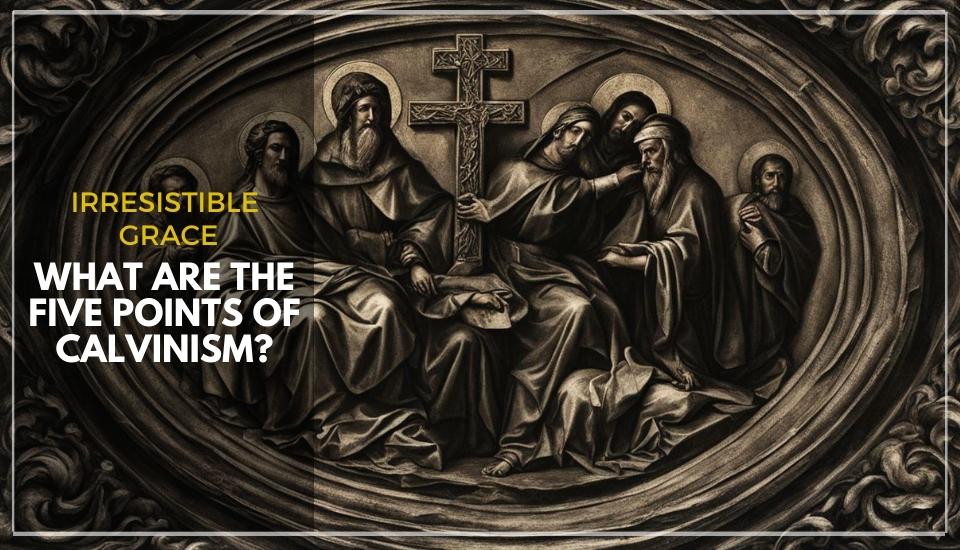What You’ll Learn
Key Takeaways
- Calvinism is a theological system based on the five points, or Doctrines of Grace.
- The five points of Calvinism are Total Depravity, Unconditional Election, Limited Atonement, Irresistible Grace, and the Perseverance of the Saints.
- Total Depravity asserts the sinfulness of mankind and their inability to obey God’s law.
- Unconditional Election teaches that salvation is solely determined by God’s will, not by human actions.
- Limited Atonement states that Jesus’ death on the cross was specifically for those elected by God.
- Irresistible Grace emphasizes that those called by God will ultimately be saved and their resistance will be overcome.
- The Perseverance of the Saints asserts that once truly saved, salvation is eternally secure.
Tulip: The Five Points of Calvinism
Calvinism is a theological system that is centered around the “five points of Calvinism”, which are fundamental principles shaping the Calvinist belief system. These points, also known as the Doctrines of Grace, outline key religious principles that guide the Calvinist understanding of salvation and human nature.
Also known as Reformed theology, Calvinism takes its name from the teachings of John Calvin, a 16th-century French theologian and pastor. Calvin’s ideas and writings played a significant role in shaping the religious landscape of his time and continue to influence believers today.
The Reformation was a period of religious upheaval in Europe, challenging the authority of the Catholic Church and leading to the formation of various Protestant denominations. Calvinism emerged as one of the major branches of the Reformed tradition, drawing its theological foundations from Calvin’s teachings.
| The Five Points of Calvinism: |
|---|
| Total Depravity |
| Unconditional Election |
| Limited Atonement |
| Irresistible Grace |
| The Perseverance of the Saints |
Understanding Total Depravity in Calvin’s Doctrine of Grace
Total Depravity, the first of the five points of Calvinism, emphasizes the sinful nature of humanity and their inability to meet God’s standards. It teaches that every person is born into sin, completely corrupted by their sinful nature, and unable to obey God’s law on their own. This doctrine highlights the fallen state of mankind and the need for divine intervention for salvation.
Calvinists believe that as a result of the fall of Adam and Eve, all human beings are born with a sinful nature that separates them from God. This inherent sinfulness affects every aspect of a person’s being, including their thoughts, desires, and actions. It means that no one can achieve righteousness or please God through their own efforts.
The concept of Total Depravity does not imply that every person is as wicked as they could possibly be, but rather that sin has permeated every aspect of their being, rendering them incapable of choosing God or obeying His law apart from His grace. It is the starting point of the Calvinist belief system, recognizing that salvation cannot be attained through human merit, but only through the sovereign grace of God.
Total Depravity is a foundational principle of Calvinism, emphasizing the sinful nature of humanity and their inability to obey God’s law. It acknowledges that salvation cannot be achieved through human effort alone, but is entirely dependent on God’s grace and intervention. This doctrine sets the stage for the remaining four points of Calvinism, each building upon the understanding of humanity’s fallen state and the need for God’s sovereign work in salvation.
Unconditional Election: Salvation by God’s Will
Unconditional Election, one of the five points of Calvinism, teaches that salvation is entirely dependent on God’s choice, not on anything humans do. It asserts that God, in His sovereign will, elects certain individuals for salvation, regardless of their merits or actions. This concept challenges the common belief that salvation can be earned through good works or personal righteousness.
In Calvinist theology, Unconditional Election is a profound expression of God’s grace towards His people. It emphasizes that salvation is a gift bestowed solely based on God’s favor and not on any human effort.
As the Apostle Paul wrote in Ephesians 1:4-5, “For he chose us in him before the creation of the world to be holy and blameless in his sight. In love, he predestined us for adoption to sonship through Jesus Christ, in accordance with his pleasure and will.” This passage highlights the divine initiative in choosing those who will receive salvation.
This doctrine also implies that God’s election is not arbitrary or unjust. While it may be challenging to comprehend how God’s sovereignty and human responsibility coexist, Calvinists believe that God’s character is perfectly just and righteous. The exact reasons behind God’s election remain a mystery, but Calvinism teaches that it is rooted in His infinite wisdom and love.
The Wonder of God’s Unconditional Election
Unconditional Election serves as a reminder of the profound nature of God’s grace and the salvation He offers. It humbles human pride, as it emphasizes that our salvation is not a result of our own achievements or abilities. Instead, it redirects our focus to God’s sovereignty and magnifies His unfathomable love towards His chosen people.
“The doctrine of election is one of the most comforting and awe-inspiring truths in the Bible. It assures believers that their salvation rests securely in God’s hands and cannot be shaken by anything in this world.”
Understanding Unconditional Election helps believers to appreciate the depth of God’s love and to trust in His faithfulness. It encourages humility, gratitude, and a reliance on God’s grace alone. As John 15:16 states, “You did not choose me, but I chose you and appointed you so that you might go and bear fruit—fruit that will last—and so that whatever you ask in my name the Father will give you.”
Limited Atonement: Jesus’ Death for the Elected

Limited Atonement, a key doctrine of Calvinism, affirms that Jesus’ sacrifice was intended for the salvation of those whom God has elected to be saved. This concept highlights the specific nature of Jesus’ death on the cross, emphasizing that it was not a general atonement for all of humanity, but rather a targeted redemption for the chosen few.
In Calvinistic belief, the purpose of Jesus’ death was to secure the salvation of the elect, those individuals predestined by God to receive His grace and be saved. This understanding stems from the belief in Unconditional Election, which asserts that God, in His sovereign will, has chosen certain individuals for salvation, irrespective of their own merits or actions.
Proponents of Limited Atonement argue that if Jesus’ sacrifice was intended for everyone, then logically, all people should be saved. However, this is not the case, as Calvinists believe that not all individuals will ultimately be saved due to their inherent sinfulness and their rejection of God’s grace. Therefore, Jesus’ death is considered to be effective only for the elect, securing their salvation and providing redemption.
It is important to note that Limited Atonement should not be confused with the idea of limited love or compassion from God. Calvinists believe that God’s love is boundless, but His redemptive work through Jesus’ sacrifice is specific to those whom He has chosen for salvation. This doctrine serves as a cornerstone of Calvinism, highlighting the sovereignty and purposeful nature of God’s plan for the redemption of His elect.
| Doctrines of Grace | Summary |
|---|---|
| Total Depravity | All of mankind is inherently sinful and unable to obey God’s law. |
| Unconditional Election | Salvation is solely determined by God’s will, not by human actions. |
| Limited Atonement | Jesus’ death on the cross was specifically for the elect, those chosen by God for salvation. |
| Irresistible Grace | Those called by God will ultimately be saved, and their resistance will be overcome. |
| The Perseverance of the Saints | Once a person is truly saved, their salvation is eternally secure. |
Embracing Irresistible Grace
Irresistible Grace, one of the five points of Calvinism, and a type of Grace, highlights the power of God’s grace to overcome human resistance and draw the chosen to salvation. It emphasizes that those who are called by God will ultimately be saved, regardless of their initial resistance. This concept is rooted in the belief that God’s grace is irresistible and cannot be thwarted by human will or actions.
The Calvinist doctrine of Irresistible Grace is based on the idea that God’s grace is efficacious and able to bring about the salvation of individuals. It teaches that when God calls someone to salvation, their resistance will be overcome through the work of the Holy Spirit. This work is seen as a supernatural transformation that enables the chosen person to respond in faith and accept the offer of salvation.
“For by grace you have been saved through faith. And this is not your own doing; it is the gift of God, not a result of works, so that no one may boast.” – Ephesians 2:8-9
Irresistible Grace assures believers that their salvation is solely dependent on God’s unconditional election and sovereign grace. It provides comfort and assurance, knowing that their salvation is not based on their own efforts or abilities, but on God’s unmerited favor. This doctrine is seen as a profound expression of God’s love and mercy towards His chosen people.
Irresistible Grace is a fundamental aspect of Calvinism that underscores the power of God’s grace to overcome human resistance and draw the chosen to salvation. It serves as a reminder that our salvation is a gift freely given by God, not something we can earn or achieve through our own works.
As believers, we can find comfort and assurance in the knowledge that God’s grace is irresistible and that He will accomplish His purposes in bringing His chosen people to salvation.
If You Want Results-Focused Consulting or an Unforgettable Speaker, Inquire About Booking Dr. Jackson Today.
The Perseverance of the Saints: Eternal Security
The Perseverance of the Saints, the last of the five points of Calvinism, affirms the assurance of eternal security for those who have genuinely found salvation. This doctrine teaches that once a person is truly saved, their salvation is eternally secure and cannot be lost.
It is based on the belief that God’s grace is irresistible and that those who are chosen by God will continue to persevere in their faith until the end.
Calvinists believe that God’s sovereignty is the foundation of this doctrine. They believe that God, in His infinite wisdom and power, is able to keep His chosen ones from falling away.
This assurance of eternal security provides comfort and encouragement to believers, knowing that their salvation is not dependent on their own efforts or actions but on the unfailing love and faithfulness of God.
This belief in the perseverance of the saints is supported by biblical passages such as Romans 8:38-39, which states, “For I am convinced that neither death nor life, neither angels nor demons, neither the present nor the future, nor any powers, neither height nor depth, nor anything else in all creation, will be able to separate us from the love of God that is in Christ Jesus our Lord.” Calvinists interpret this to mean that nothing can separate a true believer from the love of God and therefore their salvation is secure.
| Key Points | Summary |
|---|---|
| Eternal Security | The belief that once a person is genuinely saved, their salvation is secure for eternity. |
| God’s Sovereignty | Calvinists believe that God’s power and wisdom enable Him to preserve His chosen ones from falling away. |
| Assurance and Comfort | The doctrine of the perseverance of the saints provides believers with assurance and comfort, knowing that their salvation is not dependent on their own efforts. |
The Perseverance of the Saints is a fundamental belief in Calvinism that emphasizes the eternal security of those who have genuinely found salvation. It is founded on the belief in God’s sovereignty and His ability to keep His chosen ones from falling away. This doctrine provides assurance and comfort to believers, knowing that their salvation is secure and cannot be lost.
Criticisms and Debates of Calvinism and Reformed Theology

While Calvinism has a strong following, it also faces criticisms and ongoing debates, especially concerning the idea of the elect and the broader implications of Reformed theology. Critics argue that the concept of the elect is exclusive and undermines the idea of God’s love for all people.
They question the fairness of a belief system where some individuals are predestined for salvation while others are not.
Another point of contention is the tension between God’s sovereignty and human free will, Calvinism and Arminianism, if you will. Some argue that Calvinism’s emphasis on God’s absolute control over salvation diminishes the responsibility and agency of human beings. They believe that individuals should have the ability to choose their own faith and have a say in their salvation.
Debates also arise around the implications of Reformed theology on social and political issues. For example, critics argue that the Calvinist belief in predestination can lead to fatalism and a lack of initiative to address societal problems.
They suggest that this belief system may discourage efforts to create a more just and equitable society, as it can be seen as accepting the status quo as part of God’s plan.
| Common Criticisms of Calvinism | ♦ Exclusivity of the elect | ♦ Diminished human free will | ♦ Potential fatalism |
|---|---|---|---|
| Debates Surrounding Reformed Theology | ♦ Implications for social and political issues | ♦ Relationship between God’s sovereignty and human agency | ♦ The fairness of predestination and salvation |
Despite these criticisms and debates, Calvinism continues to have a significant impact on the religious landscape. Its emphasis on God’s sovereignty, the power of grace, and the assurance of salvation resonates with many believers.
The Doctrines of Grace provide a framework for understanding God’s role in salvation and offer a sense of security for those who adhere to this belief system.
Ultimately, the criticisms and debates surrounding Calvinism reflect the complex and multifaceted nature of theology and religious belief. Through ongoing dialogue and respectful exchange of ideas, individuals can gain a deeper understanding of these doctrinal differences and their implications.
Whether one embraces Calvinism or not, it is through the pursuit of knowledge and open-mindedness that we can foster a more inclusive and compassionate religious discourse.
Grace Ambassador: Bringing Heaven To Earth
As believers, we have received unimaginable grace from the Father. Unfortunately, we often separate our spiritual life from our everyday lives. We fail to value the grace given to us, and we miss the opportunity to bring heaven to earth. Then we wonder what light we can bring to a world in deep darkness.




